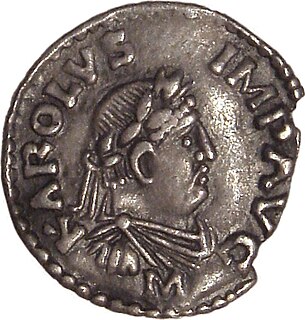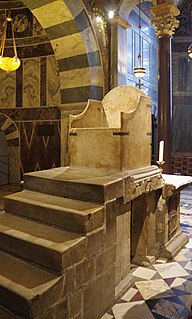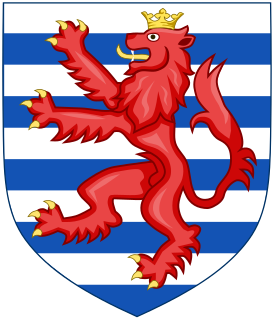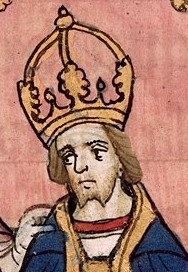The imperial election of 1346 in the Holy Roman Empire was orchestrated by Pope Clement VI after the pope had pronounced the deposition of the Emperor Louis IV. The pope's candidate, Charles of Moravia, was duly elected by five of the imperial electors at Rhense on 11 July.
On 13 April 1346 at Avignon, Clement VI declared Louis IV a heretic and schismatic and deposed him. [1] [2] He preached a sermon against Louis in which he quoted from Ambrose's letter to the Emperor Valentinian II: "What could be more honourable to the emperor than to be called a son of the [church]?" [2] Charles and his father, King John of Bohemia, were in attendance. Afterwards, Charles swore an oath to Clement that if elected he would annul all of his predecessor's acts and not spend more than one day in Rome for his imperial coronation. [1]
On 28 April 1346, Clement VI formally requested the electors to elect a new emperor. [1] Two of the electors were Charles's relations: the king of Bohemia was his father and the archbishop of Trier was his great uncle, Baldwin of Luxembourg. [3] A third, the archbishop of Mainz, Gerlach of Nassau, had only been installed after Clement deposed Henry of Virneberg on 7 April 1346. [4] Charles also received the support of Walram of Jülich, archbishop of Cologne, and Rudolf, Duke of Saxony. [5]
Charles IV was far from having universal support in the Empire while Louis still lived. He was labelled a Pfaffenkönig (parson's king) because of the role the pope played in procuring his election. The free cities of Cologne and Aachen refused to recognise him. Charles and his father went abroad after his election to assist Philip VI of France against an English invasion. John died at the battle of Crécy and Charles was seriously injured. [1] Because Aachen would not accept him, Charles was forced upon his return to be crowned in Bonn on 26 November. [1] [6] He dated his reign, however, from the moment he received papal approbation, on 6 November. This was also the day on which he took the title "King of the Romans" (until his imperial coronation). [6] His position only became secure with the death of Louis on 11 October 1347. [7]

The Holy Roman Empire was a multi-ethnic complex of territories in Western and Central Europe that developed during the Early Middle Ages and continued until its dissolution in 1806 during the Napoleonic Wars. The largest territory of the empire after 962 was the Kingdom of Germany, though it also included the neighboring Kingdom of Bohemia and Kingdom of Italy, plus numerous other territories, and soon after the Kingdom of Burgundy was added. However, while by the end of the 15th century the Empire was still in theory composed of three major blocks – Italy, Germany, and Burgundy – in practice only the Kingdom of Germany remained, with the Burgundian territories lost to France and the Italian territories, ignored in the Imperial Reform, although formally part of the Empire, were splintered into numerous de facto independent territorial entities. The external borders of the Empire did not change noticeably from the Peace of Westphalia – which acknowledged the exclusion of Switzerland and the Northern Netherlands, and the French protectorate over Alsace – to the dissolution of the Empire. By then, it largely contained only German-speaking territories, plus the Kingdom of Bohemia. At the conclusion of the Napoleonic Wars in 1815, most of the Holy Roman Empire was included in the German Confederation.

Louis IV, called the Bavarian, of the house of Wittelsbach, was King of the Romans from 1314, King of Italy from 1327, and Holy Roman Emperor from 1328.

Wenceslaus IV was king of Bohemia from 1363 until his death, as well as king of Germany from 1376 until he was deposed in 1400. He belonged to the House of Luxembourg.

Charles IV, born Wenceslaus, was the first King of Bohemia to become Holy Roman Emperor. He was a member of the House of Luxembourg from his father's side and the Czech House of Přemyslid from his mother's side; he emphasized the latter due to his lifelong affinity for the Czech side of his inheritance, and also because his direct ancestors in the Přemyslid line included two saints.

The Holy Roman Emperor, originally and officially the Emperor of the Romans during the middle ages, and also known as the German-Roman Emperor since the early modern period, was the ruler and head of state of the Holy Roman Empire. The Empire was considered by the Roman Catholic Church to be the only legal successor of the Roman Empire during the Middle Ages and the early modern period. The title was held in conjunction with the title of King of Italy from the 8th to the 16th century, and, almost without interruption, with the title of King of Germany throughout the 12th to 18th centuries.

Adolf was Count of Nassau from about 1276 and elected King of the Romans from 1292 until his deposition by the prince-electors in 1298. He was never crowned by the Pope, which would have secured him the title of Holy Roman Emperor. He was the first physically and mentally healthy ruler of the Holy Roman Empire ever to be deposed without a papal excommunication. Adolf died shortly afterwards in the Battle of Göllheim fighting against his successor Albert of Habsburg.

King of the Romans was the title used by the German king following his election by the princes from the reign of Emperor Henry II (1014–1024) onward. The title predominantly amounted to being the emperor of the Holy Roman Empire and was dependent upon coronation by the pope.

Frederick the Fair or the Handsome, from the House of Habsburg, was the duke of Austria and Styria from 1308 as well as the anti-king of Germany from 1314 until 1325 and then co-king until his death.

The Limburg-Luxemburg dynasty, one of several families from different periods known as the Luxembourg dynasty was a royal family of the Holy Roman Empire in the Late Middle Ages, whose members between 1308 and 1437 ruled as kings of Germany and Holy Roman emperors as well as kings of Bohemia and Hungary. Their rule was twice interrupted by the rival House of Wittelsbach.

The Declaration of Rhens or Treaty of Rhens was a decree or Kurverein of the Prince-electors of the Holy Roman Empire issued in 1338 and initiated by Baldwin of Luxembourg, the Archbishop of Trier and brother of the late Emperor Henry VII.

The Coronation of the Holy Roman Emperor was a ceremony in which the ruler of Western Europe's then-largest political entity received the Imperial Regalia at the hands of the Pope, symbolizing both the pope's right to crown Christian sovereigns and also the emperor's role as protector of the Roman Catholic Church. The Holy Roman Empresses were crowned as well.

Henry VII was the King of Germany from 1308 and Holy Roman Emperor from 1312. He was the first emperor of the House of Luxembourg. During his brief career he reinvigorated the imperial cause in Italy, which was racked with the partisan struggles between the divided Guelf and Ghibelline factions, and inspired the praise of Dino Compagni and Dante Alighieri. He was the first emperor since the death of Frederick II in 1250, ending the Great Interregnum of the Holy Roman Empire; however, his premature death threatened to undo his life's work. His son, John of Bohemia, failed to be elected as his successor, and there was briefly another anti-king, Frederick the Fair contesting the rule of Louis IV.

Guy of Boulogne was a statesman and cardinal who served the Avignon Papacy for 33 years. He participated in the papal conclaves of 1352, 1362 and 1370, and was the Subdean of the Sacred College of Cardinals. His diplomatic postings were extensive, including Hungary, Italy, and Spain. He headed an effort to end the Hundred Years' War. The historian Kenneth Setton called him "one of the commanding figures of his day, and the letters of Petrarch abound with references to him".
There were many imperial interregna in the history of the Holy Roman Empire, when there was no emperor. Interregna in which there was no emperor-elect were rarer. Among the longest periods without an emperor were between 924 and 962, between 1245 and 1312, and between 1378 and 1433. The crisis of government of the Holy Roman Empire and the German kingdom thus lasted throughout the late medieval period, and ended only with the rise of the House of Habsburg on the eve of the German Reformation and the Renaissance. The term Great Interregnum is occasionally used for the period between 1250 and 1273.
The imperial election of May 22, 1400 was an imperial election held to select the emperor of the Holy Roman Empire. It took place in Frankfurt.
The imperial election of August 21, 1400 was an imperial election held to select the emperor of the Holy Roman Empire. It took place in Rhens.
The imperial election of 1411 was an imperial election held to select the emperor of the Holy Roman Empire. It took place on July 21.

The imperial election of 1273 was an imperial election held to select the emperor of the Holy Roman Empire. It took place in Frankfurt on October 1.

The imperial election of October 20, 1314 was an imperial election held to select the emperor of the Holy Roman Empire. It took place in Frankfurt.

The Imperial election of 1257 was two imperial elections in the Holy Roman Empire held to select the emperor.















